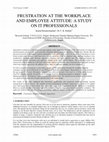Papers by KAMAL KARAMCHANDANI

Social Science Research Network, Aug 26, 2020
Information technology is the fastest growing industry today impacting all walks of life. With ho... more Information technology is the fastest growing industry today impacting all walks of life. With hordes of young and talented people joining it, the sector provides abundant opportunities for employees to fulfil their dreams. But the fast-paced growth in the industry and the demanding work culture does extract its own price. Frustration at work, being normal daily routine, could turn into a vicious spiral for both the employer and employee leading to low productivity, disengagement, burnout, aggressive behavior, and high attrition rate. This study investigates the relationship between frustration and employee attitude at the job in the IT industry. The study has looked at the interaction of the variables for both male and female employees. Further, since frustration finds an outlet in anger which may lead to aggression, the influence of the same on employee attitude was also examined. For this ex-post facto research, a convenience sample of 390 respondents through the stratified sampling technique was chosen in 2019 from various IT firms in Hyderabad and Nagpur. Respondents were chosen from the age group 25-35 years. The data for analysis was collected through 2 test /scale viz. 1) Frustration Test by Prof N.S. Chauhan and Dr. Govind Tiwari 2) Attitude Scale for Measuring Employee Attitude Towards Management by Dr. K D Kapoor and a personal information sheet. The statistical tool of Pearson Correlation was applied to ascertain the strength and direction of the relationship. The results of the study confirmed that frustration significantly and negatively predicted attitude towards management of the employees. The attitude towards management of female employees was found to be slightly more and negatively related to frustration compared to their male counterparts but the difference is negligible. Hence no significant difference was found in the attitude of the two sexes due to frustration at the workplace. The study also looked at the influence of aggression on the employee attitude and the same was found to be significant.

International Journal of Engineering and Management Research, 2020
Information technology is the fastest growing sector in the country and the highest employer in t... more Information technology is the fastest growing sector in the country and the highest employer in the private sector. The fast-paced technological changes, the need to keep up with it and the huge workload puts enormous demands on the employees. They experience anxiety and stress at the workplace which affects, positively and negatively, their attitude towards their job and management. Hence, the study investigated the relationship between anxiety and stress experienced by the employees at the workplace and how each factor affects their attitude towards their management respectively. Since the study covered both male and female employees, hence similar nature of relationship between the variables was also examined separately for each gender
For this ex-post facto research, a convenience sample of 200 respondents through stratified sampling technique was chosen in 2019 from various IT firms in Hyderabad. The age of the respondents was between 24-36 years. The data for analysis was collected through 3 scales/ index viz. 1) Job Anxiety Scale by Dr. A. K. Srivastava 2) Occupational Stress Index by A K Srivastav and A P Singh 3) Attitude Scale for Measuring Employee Attitude Towards Management Attitude Scale for Measuring Employee Attitude Towards Management by Dr. K D Kapoor and a personal information sheet. Statistical tools of Pearson was applied to analyse the data.
The results of the study confirmed that occupational stress significantly and negatively predicted attitude towards management of the employees. But, on the contrary for job anxiety the relationship with employee attitude was found to be insignificant. The attitude towards management of female employees was found to be more significantly and negatively related to job anxiety and occupational stress respectively as compared to their male counterparts. This result belied the expectations. However, no interaction effect was observed between job anxiety and occupational stress while predicting attitude towards management. It is recommended that IT companies must design general and gender based intervention strategies to reduce job anxiety and occupational stress among employees.
Keywords-- Job Anxiety, Occupational Stress, Attitude towards Management

International Journal of Advance Research and Innovative Ideas in Education , 2020
Information technology is the fastest growing industry today impacting all walks of life. With ho... more Information technology is the fastest growing industry today impacting all walks of life. With hordes of young and talented people joining it, the sector provides abundant opportunities for employees to fulfil their dreams. But the fast-paced growth in the industry and the demanding work culture does extract its own price. Frustration at work, being normal daily routine, could turn into a vicious spiral for both the employer and employee leading to low productivity, disengagement, burnout, aggressive behavior, and high attrition rate. This study investigates the relationship between frustration and employee attitude at the job in the IT industry. The study has looked at the interaction of the variables for both male and female employees. Further, since frustration finds an outlet in anger which may lead to aggression, the influence of the same on employee attitude was also examined. For this ex-post facto research, a convenience sample of 390 respondents through the stratified sampling technique was chosen in 2019 from various IT firms in Hyderabad and Nagpur. Respondents were chosen from the age group 25-35 years. The data for analysis was collected through 2 test /scale viz. 1) Frustration Test by Prof N.S. Chauhan and Dr. Govind Tiwari 2) Attitude Scale for Measuring Employee Attitude Towards Management by Dr. K D Kapoor and a personal information sheet. The statistical tool of Pearson Correlation was applied to ascertain the strength and direction of the relationship. The results of the study confirmed that frustration significantly and negatively predicted attitude towards management of the employees. The attitude towards management of female employees was found to be slightly more and negatively related to frustration compared to their male counterparts but the difference is negligible. Hence no significant difference was found in the attitude of the two sexes due to frustration at the workplace. The study also looked at the influence of aggression on the employee attitude and the same was found to be significant.









Uploads
Papers by KAMAL KARAMCHANDANI
For this ex-post facto research, a convenience sample of 200 respondents through stratified sampling technique was chosen in 2019 from various IT firms in Hyderabad. The age of the respondents was between 24-36 years. The data for analysis was collected through 3 scales/ index viz. 1) Job Anxiety Scale by Dr. A. K. Srivastava 2) Occupational Stress Index by A K Srivastav and A P Singh 3) Attitude Scale for Measuring Employee Attitude Towards Management Attitude Scale for Measuring Employee Attitude Towards Management by Dr. K D Kapoor and a personal information sheet. Statistical tools of Pearson was applied to analyse the data.
The results of the study confirmed that occupational stress significantly and negatively predicted attitude towards management of the employees. But, on the contrary for job anxiety the relationship with employee attitude was found to be insignificant. The attitude towards management of female employees was found to be more significantly and negatively related to job anxiety and occupational stress respectively as compared to their male counterparts. This result belied the expectations. However, no interaction effect was observed between job anxiety and occupational stress while predicting attitude towards management. It is recommended that IT companies must design general and gender based intervention strategies to reduce job anxiety and occupational stress among employees.
Keywords-- Job Anxiety, Occupational Stress, Attitude towards Management
For this ex-post facto research, a convenience sample of 200 respondents through stratified sampling technique was chosen in 2019 from various IT firms in Hyderabad. The age of the respondents was between 24-36 years. The data for analysis was collected through 3 scales/ index viz. 1) Job Anxiety Scale by Dr. A. K. Srivastava 2) Occupational Stress Index by A K Srivastav and A P Singh 3) Attitude Scale for Measuring Employee Attitude Towards Management Attitude Scale for Measuring Employee Attitude Towards Management by Dr. K D Kapoor and a personal information sheet. Statistical tools of Pearson was applied to analyse the data.
The results of the study confirmed that occupational stress significantly and negatively predicted attitude towards management of the employees. But, on the contrary for job anxiety the relationship with employee attitude was found to be insignificant. The attitude towards management of female employees was found to be more significantly and negatively related to job anxiety and occupational stress respectively as compared to their male counterparts. This result belied the expectations. However, no interaction effect was observed between job anxiety and occupational stress while predicting attitude towards management. It is recommended that IT companies must design general and gender based intervention strategies to reduce job anxiety and occupational stress among employees.
Keywords-- Job Anxiety, Occupational Stress, Attitude towards Management